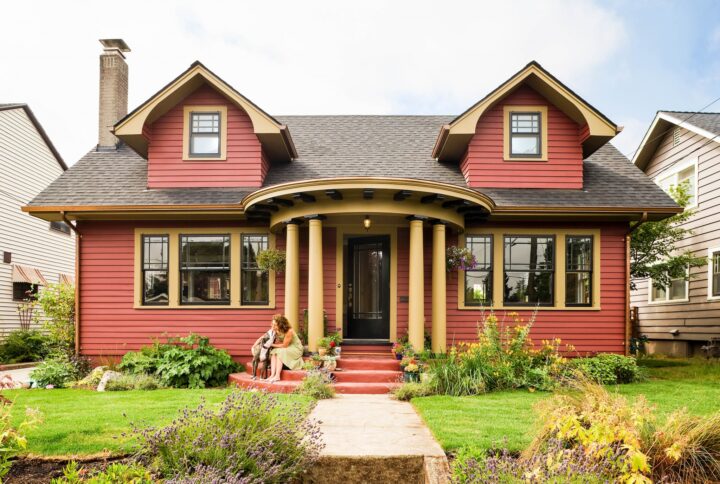How Much Does It Cost to Refinance a Mortgage?
Refinancing your mortgage comes with closing costs. Learn how much and how to save money at closing.


Written by Vivian Tejada on December 12, 2024
Refinancing a mortgage allows homeowners to renegotiate the terms of their home loan by replacing their current mortgage with a new one. Refinancing can help you lower your monthly mortgage payment, shorten your loan term, or access home equity as cash. You may also be able to switch from an adjustable- to a fixed-rate mortgage, eliminate mortgage insurance, or remove a co-signer.
While the benefits of refinancing a mortgage are clear, refinancing comes with a cost. You’ll have to pay closing costs to finalize the new mortgage loan — similar to when you bought your home. Sometimes refinancing can save you thousands of dollars, outweighing the cost to refinance. Before deciding on a mortgage refinance, learn more about the cost of refinancing and how to calculate your potential savings.
What is a mortgage refinance?
A mortgage refinance is the replacement of your current home loan with a new one. The new home loan is used to pay off the first one and usually comes with better terms, such as a lower interest rate or reduced monthly payments.
You can read more about how refinancing works, or explore refinance options with us at Zillow Home Loans*.
How much does it cost to refinance?
On average, a homeowner pays $5,000 to refinance their mortgage. The cost to refinance a mortgage depends on the size of the loan, the location of the home, and lender fees. All these costs are referred to as refinancing closing costs. Closing costs on a mortgage refinance are typically 2-6% of the remaining loan principal.
Here is a list of common refinancing fees. Note, your fees may vary depending on the location, property, lender and third parties involved in the transaction:
- Origination fee: A one-time fee charged by the lender to create and process the new loan. Origination fees are usually 1% – 1.5% of the loan principal.
- Application fee: A one-time fee charged by the lender to process your loan application, run a credit check, and complete other administrative tasks. Application fees range from $75 – $500.
- Survey fees: The cost to confirm property boundaries and verify that the land descriptions are accurate. Survey fees cost $150 – $400.
- Appraisal fee: The cost of assessing the value of the property being refinanced to make sure the property is worth the amount being borrowed. Appraisals consider the home’s condition, location, and similar properties in the area. Appraisal fees cost $300 – $700.
- Home inspection fee: The cost of assessing the condition of the property being refinanced. Home inspections take into account the home’s structure, systems, and overall safety. Home inspection fees can cost $175 – $350.
- Title services: The cost to verify ownership of the property and protect against future claims. In addition to running a title search, lenders often require homeowners to purchase title insurance to make sure there are no outstanding invoices or liens tied to the property. Title services cost $700 – $900.
- Attorney fees: The cost of employing a real estate lawyer for legal services such as drafting or reviewing transaction documents. Attorney fees range from $500 – $1,000.
- Government recording fees: Fees charged by the local government to officially record the mortgage refinance in public records. Government recording fees vary based on the location of the property being refinanced, but can cost anywhere between $25 and $250.
- Tax service fees: Fees paid to a third-party to monitor property tax payments. Lenders often require homeowners to pay tax service fees to make sure property taxes are paid on time and avoid future tax liens. Tax service fees range from $50-100.
Depending on your lender and the specific loan program, you may be responsible for additional fees, such as mortgage insurance premiums, upfront funding fees, or mortgage points. Be sure to ask your lender about all the fees associated with a mortgage refinance before deciding to move forward.
Estimated closing costs for refinance
Let’s say you have a remaining balance of $250,000 on your current adjustable-rate mortgage and rates are at 6.5%. You’d like to switch to a new 30-year fixed rate mortgage of 5%. The closing costs for a mortgage refinance would be $10,000 — or 4% of the loan principal.
You could either pay that amount upfront, or obtain a no-closing cost refinance and pay little to nothing out of pocket. Closing costs are often rolled into the mortgage principal, or offset by a higher interest rate. While a no-closing cost refinance may save you money in the short-term, you’ll probably end up paying more in interest over the life of the loan.
You can use our Refinance Calculator to estimate the cost of refinancing your mortgage and play out different scenarios to determine when refinancing is right for you.
How to lower the cost of refinancing a mortgage
Refinancing could cost you more than you save without proper planning. Here are a few things you can do to save on mortgage refinancing costs:
Roll refinancing costs into the new loan
Depending on how much equity you have, you may qualify for a no-closing cost refinance. This type of refinance option allows a borrower to lower their upfront refinancing costs by rolling prepaid fees and other closing costs into the new loan — meaning you could pay zero out of pocket expenses. Keep in mind, prepaid fees for insurance and taxes are used to establish a new escrow account for the new loan. You’ll get refunded the balance on your existing escrow account after closing.
Ask your existing lender about customer benefits
Refinancing with your existing lender may be less expensive than refinancing with a new one. Lenders might waive or lower certain fees for existing customers. Lenders are also more willing to offer favorable interest rates to borrowers who have demonstrated good will and consistently paid their mortgage on time. You may also be able to forgo a home appraisal or property survey if you’ve recently completed one.
Get at least three quotes from lenders
In addition to contacting your existing lender, reach out to at least two more lenders to compare fees and rates. Pay close attention to their closing costs and APRs. You may want to work with a mortgage broker to get a full range of offers.
Boost your credit score
Lastly, it’s always a good idea to boost your credit score by paying down debt. Improving your creditworthiness can help you get approved and obtain more favorable terms. While a lower credit score won’t eliminate or reduce your closing costs, it can help you save a significant amount in interest over time.
Is now a good time to refinance?
Your borrowing situation often informs your decision to refinance. Consider current market conditions, along with personal refinance goals, to determine if now is a good time to refinance. Start by weighing the cost of refinancing against your actual savings. For instance, if you intend to sell in five years, and a refinance only saves you $100 per month, but the upfront origination cost is $6,000 — it might not make sense to refinance. If your savings are greater or you plan to hold the new loan longer, a refinance may make sense.
Zillow research from 2024 reported that a rule of thumb among the lending industry is that refinancing may be worth considering if the mortgage rate drops by at least one percentage point. This threshold was used as a guideline to reveal that one in ten home buyers from 2023 may find refinancing advantageous. You can check current refinance rates and compare them against your current interest rate to see if you fall within this threshold.
Although saving money on interest is a major benefit of refinancing, it’s not the only reason a borrower may want to refinance. Homeowners who have accumulated at least 20% equity may seek a refinance to eliminate mortgage insurance or tap into their home equity.
Consider your short- and long-term financial goals. If you think you can get a better rate with a higher credit score, it might make sense to wait a couple of years after you’ve had the chance to improve your credit before applying for a refinance. If you need access to quick cash, it may make more sense to do a cash-out refinance now, rather than save money over time.
Speak with one of our loan officers at Zillow Home Loans* to determine if now is the right time for you to refinance your mortgage.
*An equal housing lender. NMLS #10287
Tags
How much home can you afford?
At Zillow Home Loans, we can pre-qualify you in as little as 5 minutes, with no impact to your credit score.
Zillow Home Loans, NMLS # 10287. Equal Housing Lender
Get pre-qualifiedHow much home can you afford?
See what's in reach with low down payment options, no hidden fees and step-by-step guidance from us at
Zillow Home Loans.
Zillow Home Loans, NMLS # 10287. Equal Housing Lender
Calculate your BuyAbility℠



